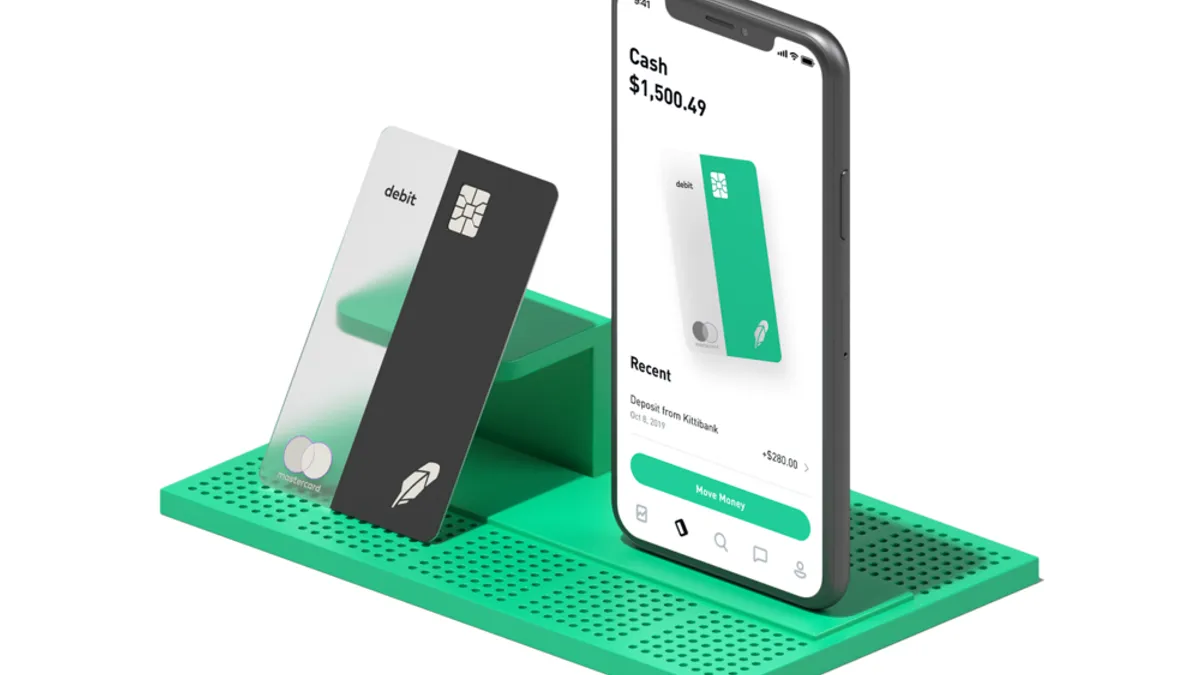UPDATE: April 1, 2020: A federal judge denied a request to stop Robinhood from reaching out to users regarding the $75 goodwill credit because the plaintiff "failed to establish a clear record of abusive communications by Defendants," according to court documents released Tuesday.
Dive Brief:
- Attorneys are accusing Robinhood of offering $75 goodwill credits to persuade users to waive their right to participate in a class-action suit against the fintech.
- The company last week emailed customers who said an outage March 2 caused Robinhood’s trading app to be unavailable while the Dow Jones Industrial Average posted its largest one-day percentage gain since 2009.
- "We'd like to start with the apology you deserve: We’re sorry for the recent outage on our platform. Your support is what helps us democratize finance for all, and we know we owe it to you to do better," the company wrote in an email March 23 to some Robinhood users, according to CNBC. "An apology alone won’t rebuild your trust in us. Instead, we hope our actions will."
Dive Insight:
Attorney Michael Taaffe is asking a federal judge in Florida to order Robinhood to stop sending "misleading communications" and to void any releases customers may have signed in response to the email. Taaffe’s son, Travis, is a plaintiff in the suit.
"We view this type of activity by Robinhood as a calculated attempt to wipe out users' class action claims without informing the users that they can instead participate in the class action should they so choose," Taaffe said in a statement, according to Bloomberg.
Claims that Robinhood is attempting to block customers from participating in any class action are inaccurate, the fintech countered in an emailed statement, adding it is quickly compensating customers who contact the company on a "case-by-case review." The company told CNBC last week it has strengthened its infrastructure to fix some engineering issues that may have been the root of this month’s issues.
The March 2 outage was one of three the fintech suffered over eight days this month, and customer reaction was swift. "#RobinHood bunch of crooks. Can’t sell my positions... for last hour. Server not working... I’m clearing all of my money out today and closing the account," one user tweeted March 2.
A Twitter account with the handle @ClassRobinhood even tagged a regulator March 2 to publicize upcoming litigation. "Hey @FINRA. Just an FYI we are going full scorched earth on Robinhood," the user wrote. That Twitter account, "Robinhood Class Action," has more than 8,000 followers. The Financial Industry Regulatory Authority fined Robinhood $1.25 million in December for failing to ensure customers were getting the best deal on their orders.
Abe Kasbo, CEO at marketing communications firm Verasoni Worldwide, told Banking Dive this month transparency would be crucial for Robinhood to maintain its brand integrity. "There may be some users who close their accounts, but I doubt the number will be of any consequence to the company," he said.
Many of Robinhood’s 10 million customers are millennials — some, new to investing.
Robert Johnson, a Creighton University finance professor, said although Robinhood's problems could spur investors to leave the platform, the outage likely wouldn't lead to any successful lawsuits.
"The user agreement has language to the effect that they don't guarantee that the platform will be accessible at all times," Johnson told Banking Dive. "Given that Robinhood's customer base is [younger], my hope is that some investors will learn a valuable lesson about market timing. … Attempting to time the market is 'fools gold.'"
The coronavirus crisis has ratcheted the volatility of the market to historic levels. The Dow Jones Industrial Average has seen its five highest daily point gains and its three largest daily point losses this month, according to Fox Business.













